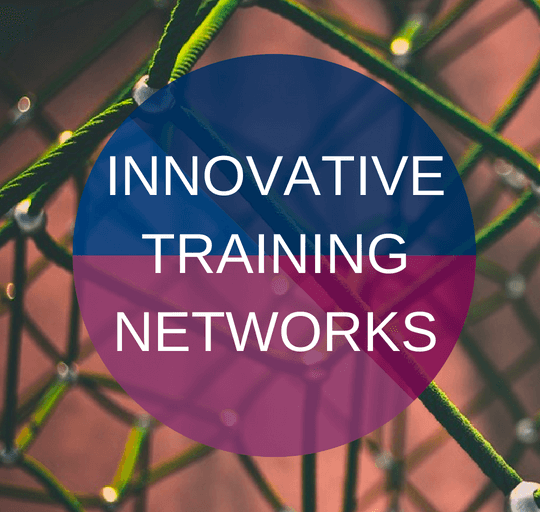What are H2020 MSCA- Innovative Training Networks (MSCA-ITN)?
Author
Christa Ivanova, PhD
Publication Date
September 14, 2019
Keywords
International researcher mobility
EU-funded PhD
interdisciplinary training
intersectoral partnerships
Marie-Curie Actions
European doctoral training
Your microfluidic SME partner for Horizon Europe
We take care of microfluidic engineering, work on valorization and optimize the proposal with you
Guidelines for H2020 MSCA-ITN applications

Who can be a beneficiary of an MSCA-ITN?

- Institutions from the academic or nonacademic sector
- Institutions from EU member countries or associated countries
- Beneficiaries have to recruit at least one young researcher for 3 to 36 months
- Beneficiaries provide scientific and/or non-scientific training to young researchers
Who are the young researchers (ESRs)?
- From any countries
- With less than 4 years of full time research since the obtention of their master degree (or equivalent)
- With less than 12 months in the host country in the past 36 months
Types of MSCA-ITN

ETN (European Training Networks)
- Minimum 3 beneficiaries from 3 EU countries or associated countries
- Participation in the non-academic sector is strongly advised
- Enrollment in PhD program is not mandatory
EID (European Industrial Doctorates)
- Minimum 2 beneficiaries – 1 academic, one non-academic
- Minimum 2 EU countries or associated countries
- Young researchers have to get a PhD at the end of the project
- Mandatory cosupervision of the PhD (one supervisor from the academic sector, the other from the nonacademic sector)
- Minimum 50% of the time in the non-academic sector
EJD (European Joint Doctorates)
- Minimum 3 beneficiaries able to deliver a PhD diploma
- Minimum 3 EU countries or associated countries
- Young researchers have to get a PhD degree from at least 2 universities from the consortium at the end of the project
Budget of MSCA-ITN
The financial support of H2020 MSCA-ITN by the EU takes into account a correction coefficient for the host country. It covers:
- Living, mobility and family allowances for the researcher (gross salary 3,150€)
- Research, training and networking costs for the institution (1,800€/month)
- Management and indirect costs (1,200€/month)
Let's build a successful MSCA-ITN consortium together!

You need an innovative SME in microfluidics for your H2020 consortium?
The Microfluidics Innovation Center brings its expertise to more than 30 European research projects.
We would be glad to join your consortium to share our scientific expertise in microfluidic instrumentation and flow management and train young researchers in entrepreneurship, innovation, and market-driven research to enhance their career perspectives in academia and industry.
Contact us at: partnership[at]microfluidic.fr
Looking for tips on how to write a successful MSCA-ITN proposal? Ensure you read our Infographic, where you will find our compiled knowledge from previous MSCA-ITN applications.
Check the Horizon Europe tips and tricks
FAQ – H2020 MSCA- Innovative Training Networks (MSCA-ITN)
1) What in basic terms were H2020 MSCA-ITN?
In the framework of Horizon 2020, Marie Sklodowska-Curie Innovative Training Networks (MSCA-ITN) were doctoral training networks that supported the funding of consortia to recruit and train Early Stage Researchers (ESRs) over a period of 3-36 months with the particular focus on mobility, cross-disciplinary research, and experience in both academic and non-academic industries.
2) Who would be a beneficiary in an MSCA-ITN?
Institutions in EU Member States or other countries were eligible as beneficiaries, either academic or non-academic, including SMEs, large companies, and research organisations in the EU. Each beneficiary had to:
Recruit not less than one ESR, not less than 3-36 months,
Offer scientific and/or non-scientific training, regularly with entrepreneurship, transferable skills, and secondments.
3) Who was considered an Early-Stage Researcher (ESR)?
In MSCA-ITN, ESRs were:
-From any country,
-Fewer than 4 years of full-time research experience beyond acquiring a master’s degree (or equivalent, etc.),
-Who had not stayed in the host country over a period of less than 12 months in the last 36 months (the mobility rule).
This definition better positioned ITNs as a very attractive option to young researchers interested in getting the international PhD-type experience.
4) What were the top three MSCA-ITN?
-ETN – European Training Networks.
- At least 3 beneficiaries of 3 countries which are connected with EU or other countries.
- The involvement of the non-academic sector highly promoted.
- Admission to a PhD programme was not obligatory.
-EID – European industrial doctorates.
- A minimum of 2 beneficiaries (1 academic and 1 non-academic) in 2 other EU/associated countries.
- At the project completion, ESRs have to acquire a PhD.
- Compulsory co-supervision (an academic supervisor and a non-academic supervisor).
- The ESRs dedicate more than 50% of their time to the non-academic sector.
-EJD – European Joint Doctors-European.
- Minimum 3 beneficiaries with the ability to award a PhD.
- Minimum number of EU/associated countries is 3.
- The ESRs are required to receive a joint, dual, or multiple PhD, usually in at least two member universities.
5) What was the budget of MSCA-ITN?
Funding and generous support of ESRs, as well as flat-rate contributions to the host:
-Family, mobility, and living allowances of the researcher (gross salary of approximately EUR3,150/month with country correction coefficient).
-EUR1,800/month, per ESR, research, training, and networking costs.
-EUR1,200/month per ESR managerial and indirect expenses.
It was this structure that has made ITNs as one of the most appealing schemes to construct the well-supported international doctoral networks.
6) What did MSCA-ITN actually invest in activities?
The basic ITN projects were:
-Each ESR has individual research projects that are within a coherent network theme.
-Local and network training (schools, workshops, secondments, transferable skills).
-High emphasis on mobility (international and intra scholastic/non scholastic).
-Designated supervision and career development programmes of every ESR.
In technical subjects such as microfluidics, this implied that ESRs could be trained in both basic science and practical instrumentation and business.
7) In what way would an industrial SME such as the Microfluidics Innovation Center become part of MSCA-ITN / doctoral networks?
-MIC has offered expertise to over 30 European projects.
-It offers microfluidic tools and flow-control expertise, and makes ideas work.
-It also equips ESRs with entrepreneurship, innovation, and market-driven research, which is one of the fundamental requirements of MSCA-like projects.
Practically, MIC frequently serves as the non-academic beneficiary or partner on which the industrial component of the training network is tied.
8) What tangible opportunities do ESRs get when MIC is incorporated into the network?
Essential success factors when MIC is used are usually:
-Personal contact with the state-of-the-art microfluidic engineering and instrumentation.
-Prototyping experience, validation, and technology transfer.
-Innovation, IP awareness, valorisation, and business thinking training, which supplements academic supervision.
This aspect would make ESRs more workable in academia and industry and align with the MSCA’s need to advance career outlooks.
9) Does MSCA-ITN continue to operate, or what about Horizon Europe?
The H2O 20 labelling was MSCA-ITN; under Horizon Europe, the corresponding scheme is MSCA Doctoral Networks (MSCA-DN), with slightly different logic but new rules and templates. To the researcher conversant with ITN, the concepts such as networks, ESR/doctoral, and industrial exposure have a direct carryover. The MIC page explicitly directs the readers to additional Horizon Europe tips and tricks on MSCA proposals and related issues.
10) What should we do to engage MIC in developing a new MSCA-DN / doctoral network?
You can involve MIC as:
-Non-academic beneficiary having one or more doctoral candidates and hosting them,
-An associate organisation providing secondments, special training schools, or co-supervision on microfluidics and instrumentation,
-One of the main participants in the field of entrepreneurship and innovation training, the awareness of ESRs of IP, prototyping, and market-oriented research.
The need to have a long track record in EU consortia and microfluidic systems, as well as including MIC, tends to enhance the training aspect and the credibility of the implementation of doctoral network proposals.